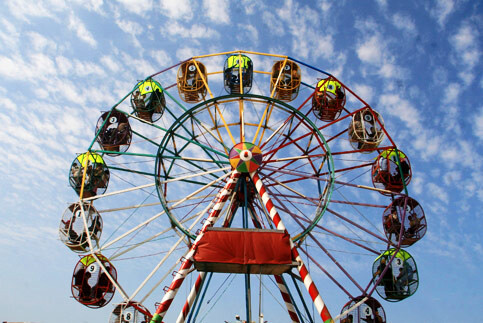Gaza City, Gaza Strip 22 October 2007

Palestinians ride a ferris wheel at an amusement park at the Shuhada junction in Gaza City. Shuhada junction was an Israeli military outpost prior to their unilateral “withdrawal” from Gaza in 2005. Shuhada junction was also the site where 12-year-old Muhammad al-Dura was shot and killed by the Israeli army in September 2000. (Iyad Albaba)
Places of entertainment in Gaza are few and far between compared with other parts of the world. While the atmosphere in Gaza is becoming more depressed and the economy is crumbling, Gaza’s population was nevertheless determined to celebrate the major Islamic holiday of Eid al-Fitr.
Sitting in al-Jundi al-Majhoul public garden in central Gaza City are two young children, Mai Sewairej and her brother Sewar. Both are dressed in black and perched on the remains of the wrecked statue of the unkown soldier after which the park is named, destroyed months ago during clashes between the Hamas and Fatah parties.
Mai and Sewar came here to enjoy the Eid holiday in a public place in Gaza. Many other children ran around playing or sitting with their families soaking up the warm Gaza sun.
Besides the gardens, there is another major public entertainment place for Gazans, the Gaza Zoo that was created in 1996.
The zoo, which is the largest in Gaza, welcomes dozens of children and parents during Eid, many more than throughout the rest of the year.
Tamer al-Qerem, a doctor from the Gaza refugee camp of al-Shati’, sat watching the zoo’s two lions as his two young children ran around playing.
“I came here for the sake of my children so they can enjoy some time away from their [miserable] living conditions with the continuous Israeli attacks as well as the factional infighting between Fatah and Hamas,” said al-Qerem.
Al-Qerem explained he does not usually come to the zoo for one main reason, “the lack of good mood or joyfulness amidst Gaza’s dire circumstances because of Israeli actions as well as the Hamas-Fatah infighting that has replaced love with hatred.”
Another man in the gardens, Ahmad Abu Helal, a merchant from Khan Younis, said, “Despite the siege and the ongoing economic deterioration, I brought my children today to the playground, so that they can enjoy some [play] time.”
“You know, my goods have been stuck at commercial crossings that have been closed by Israel; nevertheless, I have decided to come to this place for we have no other choice,” Ahmad told EI.
Rewan, Ahmad’s six-year-old daughter, said she was happy that her dad brought her and her three brothers to the playground where they could run around and have fun.
Sa’ed Khail, a 32-year-old father, sat in the garden while his kids enjoyed themselves near him in the playground.
“Since things have gotten worse in the shadow of continued Israeli attacks and the Hamas-Fatah power struggle, we have been unable to go outdoors for such entertainment. This time I only brought my children to try to help them get relief from the depression caused by our worsening condition.”
Sa’ed, who works for the Palestinian Authority, called for an end to Fatah-Hamas differences and resumption of Palestinian-Israeli peace talks, for the sake of the youngest Palestinian generation.
Entertainment in Gaza has suffered over the past several years, with cinemas and theaters closed and cultural centers only operating during a few occasions throughout the year. Cultural events have been occurring less often since the infighting in Gaza began, and with the deteriorating economic situation as well as continued Israeli attacks, survival is the main concern.
The increasing internal violence between Hamas and Fatah as well as the economic embargo on the Hamas-led government have drastically affected all areas of Gaza life — social, economic and political.
As Mai and Sewar got up to leave the gardens they said, “We want to enjoy our childhood, we want this conflict to come to an end.”
Rami Almeghari is currently contributor to several media outlets including the Palestine Chronicle, aljazeerah.info, IMEMC, The Electronic Intifada and Free Speech Radio News. Rami is also a former senior English translator at and editor in chief of the international press center of the Gaza-based Palestinian Information Service. He can be contacted at rami_almeghari at hotmail.com.
Related Links




